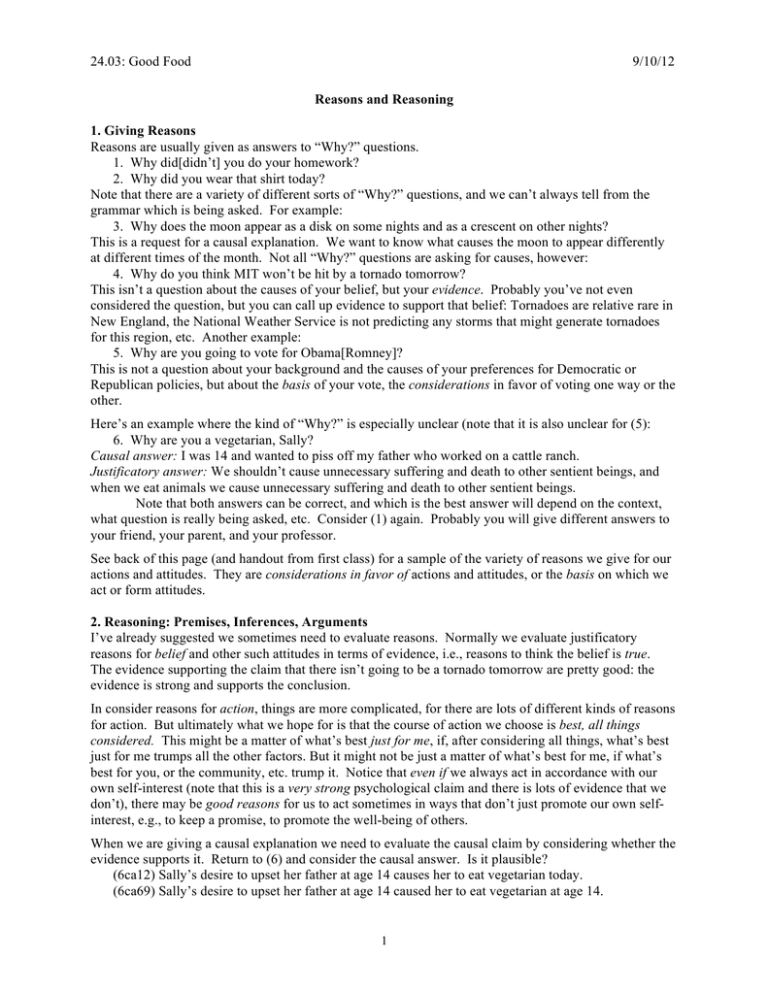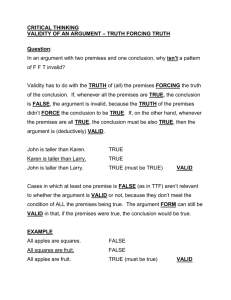Document 13519459
advertisement

24.03: Good Food 9/10/12 Reasons and Reasoning 1. Giving Reasons Reasons are usually given as answers to “Why?” questions. 1. Why did[didn’t] you do your homework? 2. Why did you wear that shirt today? Note that there are a variety of different sorts of “Why?” questions, and we can’t always tell from the grammar which is being asked. For example: 3. Why does the moon appear as a disk on some nights and as a crescent on other nights? This is a request for a causal explanation. We want to know what causes the moon to appear differently at different times of the month. Not all “Why?” questions are asking for causes, however: 4. Why do you think MIT won’t be hit by a tornado tomorrow? This isn’t a question about the causes of your belief, but your evidence. Probably you’ve not even considered the question, but you can call up evidence to support that belief: Tornadoes are relative rare in New England, the National Weather Service is not predicting any storms that might generate tornadoes for this region, etc. Another example: 5. Why are you going to vote for Obama[Romney]? This is not a question about your background and the causes of your preferences for Democratic or Republican policies, but about the basis of your vote, the considerations in favor of voting one way or the other. Here’s an example where the kind of “Why?” is especially unclear (note that it is also unclear for (5): 6. Why are you a vegetarian, Sally? Causal answer: I was 14 and wanted to piss off my father who worked on a cattle ranch. Justificatory answer: We shouldn’t cause unnecessary suffering and death to other sentient beings, and when we eat animals we cause unnecessary suffering and death to other sentient beings. Note that both answers can be correct, and which is the best answer will depend on the context, what question is really being asked, etc. Consider (1) again. Probably you will give different answers to your friend, your parent, and your professor. See back of this page (and handout from first class) for a sample of the variety of reasons we give for our actions and attitudes. They are considerations in favor of actions and attitudes, or the basis on which we act or form attitudes. 2. Reasoning: Premises, Inferences, Arguments I’ve already suggested we sometimes need to evaluate reasons. Normally we evaluate justificatory reasons for belief and other such attitudes in terms of evidence, i.e., reasons to think the belief is true. The evidence supporting the claim that there isn’t going to be a tornado tomorrow are pretty good: the evidence is strong and supports the conclusion. In consider reasons for action, things are more complicated, for there are lots of different kinds of reasons for action. But ultimately what we hope for is that the course of action we choose is best, all things considered. This might be a matter of what’s best just for me, if, after considering all things, what’s best just for me trumps all the other factors. But it might not be just a matter of what’s best for me, if what’s best for you, or the community, etc. trump it. Notice that even if we always act in accordance with our own self-interest (note that this is a very strong psychological claim and there is lots of evidence that we don’t), there may be good reasons for us to act sometimes in ways that don’t just promote our own selfinterest, e.g., to keep a promise, to promote the well-being of others. When we are giving a causal explanation we need to evaluate the causal claim by considering whether the evidence supports it. Return to (6) and consider the causal answer. Is it plausible? (6ca12) Sally’s desire to upset her father at age 14 causes her to eat vegetarian today. (6ca69) Sally’s desire to upset her father at age 14 caused her to eat vegetarian at age 14. 1 24.03: Good Food 9/10/12 In order to evaluate either claim, we would have to consider what empirical evidence there is to support the claims. This takes us back to the task of justification. Philosophers evaluate good reasons by considering reasons in the form of argument. Arguments consist of a set of premises and a conclusion. The goal is for the premises to support the conclusion, either providing evidence for the truth of the conclusion, or evidence that the action proposed in the conclusion is best, all things considered. A deductively valid argument is one in which it is not possible for the premises to be true together with the conclusion being false; a deductively sound argument is a valid one with true premises. A deductively sound argument is just about the best you can do. But sometimes we will have accomplished a lot if we can just come up with arguments whose premises are plausible and whose premises make the conclusion likely. A lot of what we will be doing in this class is evaluating arguments – both the premises and the inferences. Consider the reasons offered for being vegetarian: a) We shouldn’t cause unnecessary suffering and death to other sentient beings. b) When we eat animals we cause unnecessary suffering and death to other sentient beings. c) So we shouldn’t eat animals. Note that one might make several complaints about this argument. Both premises are controversial, and so is the inference. Can you identify why? 2 MIT OpenCourseWare http://ocw.mit.edu 24.03 Good Food: The Ethics and Politics of Food Choices Fall 2012 For information about citing these materials or our Terms of Use, visit: http://ocw.mit.edu/terms.





